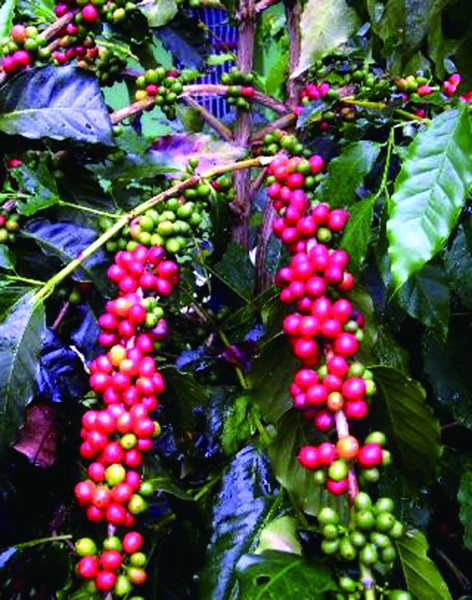Coffee Kingdom, full-bodied fragrance

Growing Coffee Tree expansion
Football, this is the most prominent symbol of Brazil. Coffee is another label in Brazil. Today, coffee has become an indispensable necessity in Brazilian life, but looking back in history, coffee is more than just a simple after-dinner drink for Brazil. It brought great vitality and vitality to this land (blog, Weibo), promoted progress and civilization, and, of course, Brazilians were deeply hurt by it.
Successful self-help in the Great Depression
Coffee appeared relatively late in Brazil, but once it entered Brazil, it brought all-round changes to the land and the people who live in it.
Around 1727, the first coffee seed was introduced from French Guiana to Para, and coffee was quickly grown in the Amazon. Since then, the green wave of coffee trees has spread, reaching a peak in the mid-19th century and rapidly replacing the declining sugar industry as Brazil's new pillar industry. Because of the comprehensive changes it has brought to Brazilian society over the next few hundred years, it can be said that the introduction and cultivation of coffee is one of the most important changes in Brazilian history.
The cultivation of coffee soon brought all-round social and economic changes to Brazil. first, it saved Brazil from the Great Depression, promoted the abolition of evil slavery, and gave birth to the Republic of Brazil.
Before coffee began to be planted on a large scale, it was the sugar industry, which mainly grew sugar cane, that dominated Brazil's domestic economy. In the 30 years before the mid-16th century, the sugar industry brought huge economic benefits to Brazil and benefited the Portuguese, its sovereign state. However, since 1650, a large number of other countries and regions in the Caribbean have joined the industry, resulting in a sharp decline in Brazilian sugar industry earnings, even to an unsustainable point-in the last 20 years of the 17th century, Brazilian sugar industry earnings fell by 2/3, which led Brazil into a period of Great Depression.
Since then, although gold panning and aquaculture have become the lifeblood of the Brazilian economy, none of them has been able to maintain long-term and large-scale prosperity and really save Brazil from the Great Depression. It is the large-scale cultivation of coffee and the sale of a large amount of coffee all over the world.
The green waves swept down with mixed feelings.
In the newly reclaimed land, coffee trees carefully cared for by workers are thriving, and they can grow to about 6 feet tall in three years and begin to bear fruit. But it takes six years to reach maximum production capacity-each tree can bear 3 to 4 pounds of fruit, and their fruiting time is between 15 and 20 years, depending on the soil and climate.
Huge profits spurred Brazilians to use more land to grow this cash crop, and the green waves of coffee trees began to spread uncontrollably across the land. Rio de Janeiro, Minas Gerais and the vast western part of Sao Paulo have joined the ranks of coffee growers, and eventually formed the coffee troika that controls Brazil's political and economic lifeline, which is still the main political situation in Brazil.
With the frantic expansion of the planting area of coffee trees in Brazil, Brazilians quickly discovered the crisis of overcapacity, and the government banned the planting of new coffee trees for five years, but previously speculative large-scale planting, so that Brazilian coffee production is still growing at a high rate beyond world consumption. In 1905, 10 million bags of coffee were in stock in Brazil. In order to prevent the influx of excess coffee into the market and lead to a fall in coffee prices, the government began to hoard coffee intentionally, but hoarding coffee requires a lot of money and manpower, which has put many small planters on the verge of bankruptcy and a large number of ordinary Brazilian workers have been displaced. Since then, although the Brazilian government has been trying to maintain this balance between production and consumption, its over-reliance on international markets has made Brazil's economy often experience roller coaster turmoil.
Important Notice :
前街咖啡 FrontStreet Coffee has moved to new addredd:
FrontStreet Coffee Address: 315,Donghua East Road,GuangZhou
Tel:020 38364473
- Prev

The first start-up coffee opens with tens of millions of dollars of investment waiting for a good project.
If you want to start a business over a cup of coffee or even meet Bole investors, where will you go? A few days ago, Zhuhai's first coffee shop as the carrier of the open business incubation platform opened, the South Software Park Venture Coffee, Entrepreneurship Dream Factory officially launched. The cooperative investment institutions also set up a $10 million angel investment fund to wait for outstanding projects.
- Next

There is a mouse cafe in London. 18 mice accompany you to have coffee.
According to the Daily Mail of July 2, you may have heard of cat cafes or rabbit cafes where cats or rabbits surround you during meals. However, the London dungeon, a scenic spot in London, recently opened a mouse coffee shop, where customers have 18 rats to accompany them in addition to drinking coffee.
Related
- Can lightly roasted coffee beans be used to extract espresso? How finely should you grind high-quality coffee beans to make Italian latte?
- What is the difference between the world's top rose summer coffee and Yejia Shefi? What are the flavor characteristics of Yega Shefi coffee and Panama rose summer?
- The ceremony is full! Starbucks starts to cut the ribbon at a complimentary coffee station?!
- A whole Michelin meal?! Lucky launches the new "Small Butter Apple Crispy Latte"
- Three tips for adjusting espresso on rainy days! Quickly find the right water temperature, powder, and grinding ratio for espresso!
- How much hot water does it take to brew hanging ear coffee? How does it taste best? Can hot water from the water dispenser be used to make ear drip coffee?
- What grade does Jamaica Blue Mountain No. 1 coffee belong to and how to drink it better? What is the highest grade of Blue Mountain coffee for coffee aristocrats?
- What are the flavor characteristics of the world-famous coffee Blue Mountain No. 1 Golden Mantelin? What are the characteristics of deep-roasted bitter coffee?
- Can I make coffee a second time in an Italian hand-brewed mocha pot? Why can't coffee be brewed several times like tea leaves?
- Hand-brewed coffee flows with a knife and a tornado. How to brew it? What is the proportion of grinding water and water temperature divided into?

